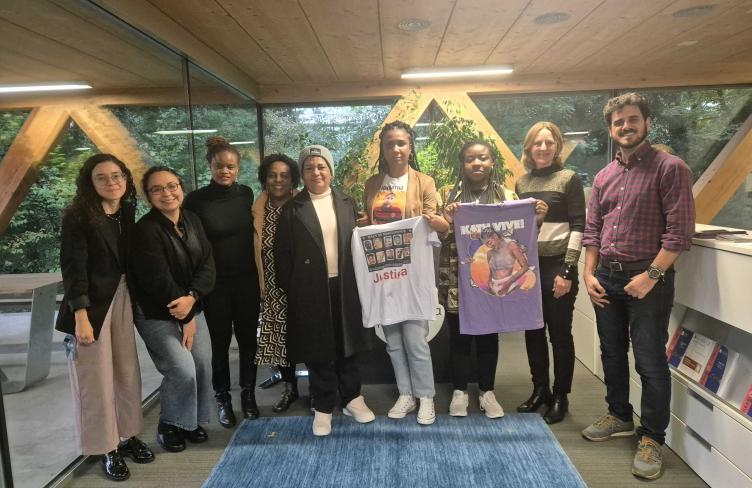
Testimonies from criminal justice actors and family of detainees, collected by the APT and partner organisations, have affirmed that custody hearings held by videoconference significantly impede the ability of a magistrate to identify and document signs of torture and ill-treatment.
In a video presentation to a public hearing of the Inter-American Commission of Human Rights in June 2021, they emphasised that communication, especially non-verbal communication, via video can be significantly compromised and that camera angles can affect how information provided by a detainee is received by the magistrate.
The criminal justice actors also noted that video conferencing may mean that detainees participate in custody hearings from police stations or prisons, in the presence of police officers or other security officials, creating an intimidating environment that can prevent them from making allegations of torture or ill-treatment.
The key message APT and partner organisations shared with the Inter-American Commission of Human Rights (IACHR) was that, to be effective, custody hearings must be held in person before a magistrate, in a judicial setting, with detainees separate from the control of law enforcement authorities.
Detention control hearings (or ‘custody hearings’ or ‘initial hearings’), held within 24 hours of a person’s detention, are a key safeguard to assess the legality of a person’s detention, prevent against arbitrary deprivation of liberty, and to investigate signs or allegations of torture or ill-treatment.
However, the COVID-19 pandemic has led to the suspension of in-person custody hearings in many countries across Latin America and a growing reliance on videoconferencing.
“This compromises the very purpose of custody hearings,” said Sylvia Dias, APT Senior Legal Adviser and Representative in Brazil.
“The use of virtual tools blurs clear communication between all parties and inhibits the opportunity for a clear account by the detainee of the circumstances of their arrest,“ Ms Dias said. “Furthermore, removing the detained person from the control of security forces or detaining authorities is a key factor in reducing the risk of torture and other ill-treatment.
The APT and civil society partners asked the IACHR to report on the effects of the current widespread use of videoconferencing in criminal hearings in the region, including the detrimental effects this has on due process and the human rights of detainees, and to issue regional guidelines for conducting remote hearings in criminal proceedings, with an explicit prohibition on the use of digital platforms for custody hearings.
International human rights bodies, including the UN Human Rights Committee and the UN Working Group on Arbitrary Detention, have stated that the physical appearance of the detained person before a judicial authority is essential for the conduct of detention control hearings.
Speaking at an event convened by the APT and other petitioner organisations on 5 October, Joel Hernández, IAHRC Commissioner and Rapporteur on Human Rights Defenders and Justice Operators, affirmed the need to differentiate when a hearing may be carried out remotely and when digital technology should not be allowed.
“In our opinion, initial, control or custody hearings bring extremely important implications for the legal situation of the detained person, and, often, the use of a virtual court is not the adequate one. Conducting these hearings virtually could also lead to the continuation of torture practices, which are not reported to the judge and which cannot be evidenced through a virtual platform.”
Joel Hernández, IAHRC Commissioner and Rapporteur on Human Rights Defenders and Justice Operators
Panellists also noted that in-person hearings can help ‘humanise’ the criminal justice system and enable judges and public prosecutors to see a face and hear the history of the person arrested. They said the lack of this direct contact may have contributed to an increase in the use of pre-trial detention across the region.
A 2020 study published by the Center for Court Innovation and the National Legal Aid & Defender Association found the use of video technology severely impairs the ability of a magistrate to read body language and non-verbal cues. For example, gestures and eye contact may not be visible due to the camera angle, computer glitches or poor connection quality.
Access to technology can also constitute a real obstacle to access to justice for many people in the region. According to a study of the Economic Commission for Latin America and the Caribbean (CEPAL), a third of the population in Latin America has limited or no access to digital technology. This can have profound implications for people deprived of liberty.
In Paraguay, the National Preventive Mechanism reported that is not uncommon for persons deprived of liberty to participate in hearings in a noisy corridor of the penitentiary, with a mobile phone in hand, desperately trying to hear how their future will be decided, often without even being able to see the magistrate.
“It is also the case that, in some countries, guards or other law enforcement officials will lend their own personal cell phones to detainees so they can access hearings,” Ms Dias said. “To ensure proper access to justice for all people deprived of liberty, it is vital that custody hearings be held face-to-face.”
Ms Dias said the pandemic should not be an obstacle to holding in-person custody hearings, with the APT producing a video series in 2020 to showcase COVID-safe practices implemented by courts in states across Brazil.
